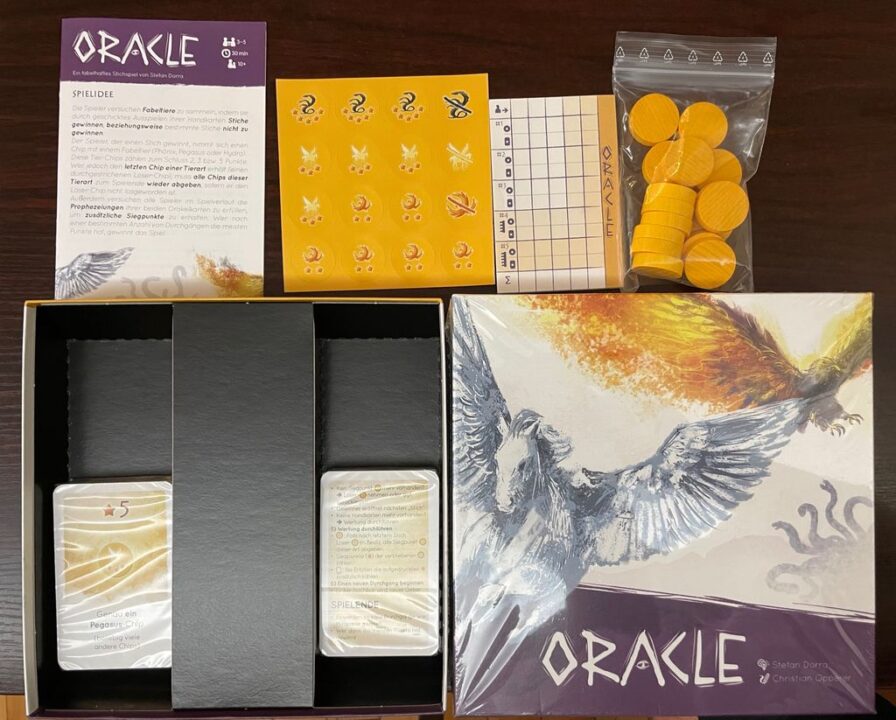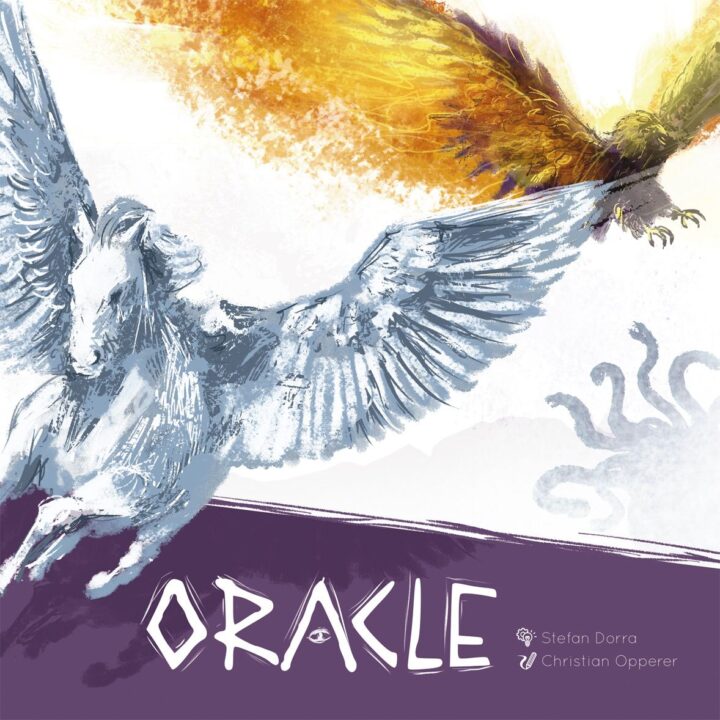Hey fellow board game enthusiasts! Today, we’re taking a closer look at Oracle, a game that’s been creating quite a buzz among strategists and casual gamers alike. This review will dive into the intriguing mechanics, player interaction, replay value, and the stunning artworks and components that Oracle offers. Buckle up, because we’ve got a lot to talk about, and I promise it’ll be both informative and hilarious (I hope!).
How It Plays
Setting Up
First, place the game board in the center. Each player picks a character and takes their matching tokens. Shuffle the Oracle cards and place them in a deck. Deal each player their starting cards. Set the resource tokens and score tracker nearby. You’re now ready to go!
Gameplay
On your turn, draw an Oracle card and follow the instructions. You might gain resources, move your character, or challenge a rival. Interact with other players by trading resources or forming temporary alliances. Use your actions wisely to gather points and sabotage opponents. The game progresses through rounds until the deck runs out.
Winning the Game
At the end of the final round, tally up your points. Points can come from completed objectives, leftover resources, and special bonuses from Oracle cards. The player with the highest score wins! The game rewards strategic planning, making every turn crucial. May the wisest player prevail!
Want to know more? Read our extensive strategy guide for Oracle.
Game Mechanics of Oracle: Finding the Balance
Let’s take a deeper look at the game mechanics of Oracle. When I first cracked open the box with my crew, we expected another generic fantasy game. But, whoa, were we wrong. Oracle has some unique mechanics that had us scratching our heads and applauding at the same time.
One thing that stood out is the prophecy system. The game allows players to draw prophecy cards which give hints about the future. It’s like looking through a mystical crystal ball, only without the fog and vague sayings. These cards can significantly affect gameplay, offering players the chance to plan their moves rather than relying on pure luck. And thank goodness for that because even my friend Larry, Mr. Lucky Dice, struggled here.
Another quirky mechanic is the influence tokens. Players use these tokens to sway the outcomes of different events. But here’s the fun part – you never have enough tokens to control everything. It’s like juggling flaming torches. Easy, right?
Now, the game board itself deserves a mention. It’s modular, meaning each game can look and feel different. This adds a layer of replayability that I adore. One night, the board layout had us feeling like we were navigating a labyrinth. Other times, it was a straightforward path to victory. This variability kept us on our toes and made each session fresh and exciting.
Lastly, I’d like to mention the balance of strategy and luck. Oracle does a stellar job making sure skill trumps randomness. There’s a bit of dice rolling involved, but you won’t feel like you’re at a craps table in Vegas. Decisions matter more here, which earns big points in my book.
Stay tuned as we jump into the realm of player interaction next!

Engaging Player Interaction in Oracle
Ah, player interaction, the bread and butter of any good board game! In Oracle, it truly shines. Picture this: you’re at the table, staring down your friends, each move loaded with potential consequences. The tension is real, folks! You don’t just play the game; you play each other.
What sets Oracle apart is its clever balance of competition and cooperation. You’ll need to trade, negotiate, and sometimes even backstab (in the most friendly way possible, of course). There’s nothing quite like the feeling when you outsmart your best friend, securing that needed resource or predicting their move before they make it.
The game’s mechanics foster a rich social dynamic. The Oracle cards, for instance, allow you to peek into future events. Sharing this knowledge can benefit the group or just you, depending on how you play your cards—pun intended! And trust me, I’ve seen friendships tested and strengthened over these Oracle cards. The strategic depth here is immense, and it’s all about reading your opponents, making alliances, and sometimes betraying them.
One memorable moment was when I convinced my friend Tom to lend me a resource in exchange for my ‘insider knowledge’. Little did he know, I bluffed my way into gaining an advantage. The look on his face when he realized—priceless!
Next, I’ll dive into the replay value of Oracle, so hold onto your meeples!
Replay Value: Why Oracle Keeps You Coming Back
Replay value is one of the key aspects that makes Oracle worth every penny. If you’re like me, after a few rounds, you’ll find yourself itching to play more. The game designers did a fantastic job ensuring each session feels fresh and exciting. Unlike some board games that start to feel repetitive, Oracle introduces new challenges and opportunities as you progress.
One of the things that really stand out is how the game evolves based on the choices made by players. The variety of strategies you can employ keeps you on your toes. One game, you might focus on gathering resources, while the next, you might go all-in on alliances. This changing dynamic means that no two games are ever the same.
Another element that boosts replay value is the inclusion of multiple scenarios and objectives. Just when you think you’ve mastered the game, a new scenario pops up and you have to rethink your entire strategy. This keeps the game from ever getting stale.
Furthermore, the interactive elements where players influence each other’s game can create endless new experiences. You’re not just playing against the game; you’re playing against your friends, and their changing strategies add a layer of unpredictability.
In short, Oracle offers a rich and varied experience with high replay value. You won’t just play it once and forget about it—this game will make a mark on your regular game nights.
Stay tuned, as next up, I’ll discuss the jaw-dropping artwork and components that make Oracle a feast for the eyes.
Artwork and Components in Oracle
Let’s talk about the art and bits in the game Oracle. Picture this: you open the box, and it’s like discovering a hidden treasure in your attic—minus the dust bunnies. The artwork is vibrant and detailed, bringing the ancient world theme to life. The board itself is a piece of art, with intricate designs that make you feel like you’re part of a grand, mythical tale.
Now, let’s move on to the components. Oracle does not skimp on quality. The cards are sturdy, and the player tokens come in different shapes and sizes, adding an extra layer of tactile joy to the game. The game pieces, like the Oracle’s crystal ball and mini temples, have a nice heft to them. You know, the kind of pieces that make you say, ‘I could whack someone with this’—not that you should, of course!
I do have a small bone to pick, though. The game comes with a lot of tiny pieces, and if you’re as clumsy as I am, expect to drop a few. Also, setting up can take some time, and God forbid you lose one of those pieces under your couch. You’ll be finding it months later, right next to last year’s missing sock.
Overall, Oracle’s artwork and components get a thumbs up from me. They contribute to the atmosphere and make the game more immersive. If you’re someone who appreciates a well-crafted game, Oracle should definitely be on your radar.
Recommendation: I wholeheartedly recommend Oracle for its stunning artwork and top-notch components. Just be careful you don’t lose any pieces, or you might find yourself consulting an actual oracle to locate them!
Conclusion
Oracle is a gem in the board game world. The unique mechanics keep luck at bay, making every move count. The player interaction is top-notch, encouraging both competition and cooperation in a fun way. The replay value is high, thanks to the evolving strategies and varied scenarios. The artwork and components make the game visually appealing and immersive. While Oracle isn’t perfect, it’s a solid choice for game nights. If you love strategy and interaction, Oracle is worth adding to your collection. That wraps up our review. Happy gaming, folks!


